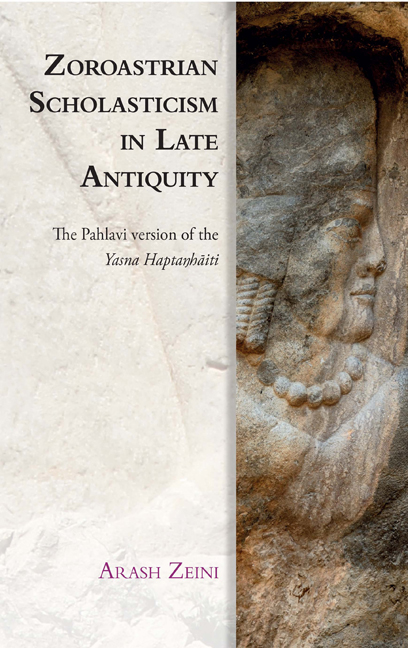Book contents
- Frontmatter
- Contents
- List of Figures
- List of Tables
- Acknowledgements
- Series Editor’s Preface
- Preface
- Conventions
- Abbreviations
- Dedication
- Part I Introduction
- 1 Introduction
- 2 The Zand
- 3 Scholasticism
- 4 Fire in Zoroastrianism
- 5 Precis: Yasn Ī Haft Hād
- Part II Text and translation
- 6 PY 35
- 7 PY 36
- 8 PY 37
- 9 PY 38
- 10 PY 39
- 11 PY 40
- 12 PY 41
- Part III Miscellaneous Observations
- 13 PY
- 14 PY 36
- 15 PY 37
- 16 PY 38
- 17 PY 39
- 18 PY 40
- 19 PY 41
- Part IV Epilogue
- 20 Reflections on the Zand
- Appendices
- Appendix A Transliteration and Apparatus
- Appendix B Y 9.1
- Appendix C Fire in the Older Avesta
- Appendix D Iϑā
- Appendix E MSS Concordance
- Bibliography
- Index of Passages Quoted
16 - PY 38
Published online by Cambridge University Press: 14 October 2020
- Frontmatter
- Contents
- List of Figures
- List of Tables
- Acknowledgements
- Series Editor’s Preface
- Preface
- Conventions
- Abbreviations
- Dedication
- Part I Introduction
- 1 Introduction
- 2 The Zand
- 3 Scholasticism
- 4 Fire in Zoroastrianism
- 5 Precis: Yasn Ī Haft Hād
- Part II Text and translation
- 6 PY 35
- 7 PY 36
- 8 PY 37
- 9 PY 38
- 10 PY 39
- 11 PY 40
- 12 PY 41
- Part III Miscellaneous Observations
- 13 PY
- 14 PY 36
- 15 PY 37
- 16 PY 38
- 17 PY 39
- 18 PY 40
- 19 PY 41
- Part IV Epilogue
- 20 Reflections on the Zand
- Appendices
- Appendix A Transliteration and Apparatus
- Appendix B Y 9.1
- Appendix C Fire in the Older Avesta
- Appendix D Iϑā
- Appendix E MSS Concordance
- Bibliography
- Index of Passages Quoted
Summary
PY 38.1
mādagān
As Hintze (2007a: 197) points out, scholars have debated the precise meaning of the Av. term gənā-. The question is whether the female beings referred to by gənā- are human or associated with the realm of the divine. Drawing attention to a number of Vedic parallels, Hintze (2007a: 205) rightly concludes that in the YH the ‘noblewomen’ are the four entities who are mentioned in Y 38.2: īžā- ‘ libation’, yaošti- ‘ vitalization’, fərašti- ‘ perfection’ and ārmaiti- ‘right-mindedness’. In PY 38.1a and b, mādagān ‘ females’ and mādag ‘ female’ translate the instr.pl. gənābīš and the nom.pl. gənā̊, respectively. The term mādag on its own, however, does not provide further information about the exegetes’ interpretation of the passage and the term gənā-. The attestation of mādag in the PYH does not furnish further information either (Table 16.1).
However, the Zand of Y 38.2 suggests that the priests did not associate the above-mentioned abstract concepts with females of divine origin. As Table 16.2 shows, the Zand pertaining to the four gənā- offers a very different view and context. For one thing, where we would perhaps expect a list of four names, the Zand constructs an obscure and difficult clause, where the hapax legomenon yaoštaiiō, for instance, features as an inflected verb (see Section 16.2.2).
az ahlāyīh abāgīh
The expression az ahlāyīh abāgīh ‘ with the assistance of righteousness’ occurs in PY35.9a, 38.1c and 41.3a, translating aṣ̌āat̰cā hacā, aṣ̌āt̰hacā and aṣ̌aŋhācim, respectively. The expression does not seem to be attested in the nontranslation MP literature, while in the PY it is the standard translation for aṣ̌āt̰, the abl.sg. of aṣ̌a- ntr. governed by the adposition hacā ‘ from, in agreement with, on account of ‘. In all three occurrences in the PYH the expression is followed by the comment az ašwahišt hammis ‘ together with Ašwahišt’, associating the rather abstract concept of ahlāyīh ‘ order’ with Ašwahišt, the second of the Amahraspandān who is the guardian of the fire.
- Type
- Chapter
- Information
- Zoroastrian Scholasticism in Late AntiquityThe Pahlavi Version of the Yasna Haptaŋhāiti, pp. 249 - 262Publisher: Edinburgh University PressPrint publication year: 2020



